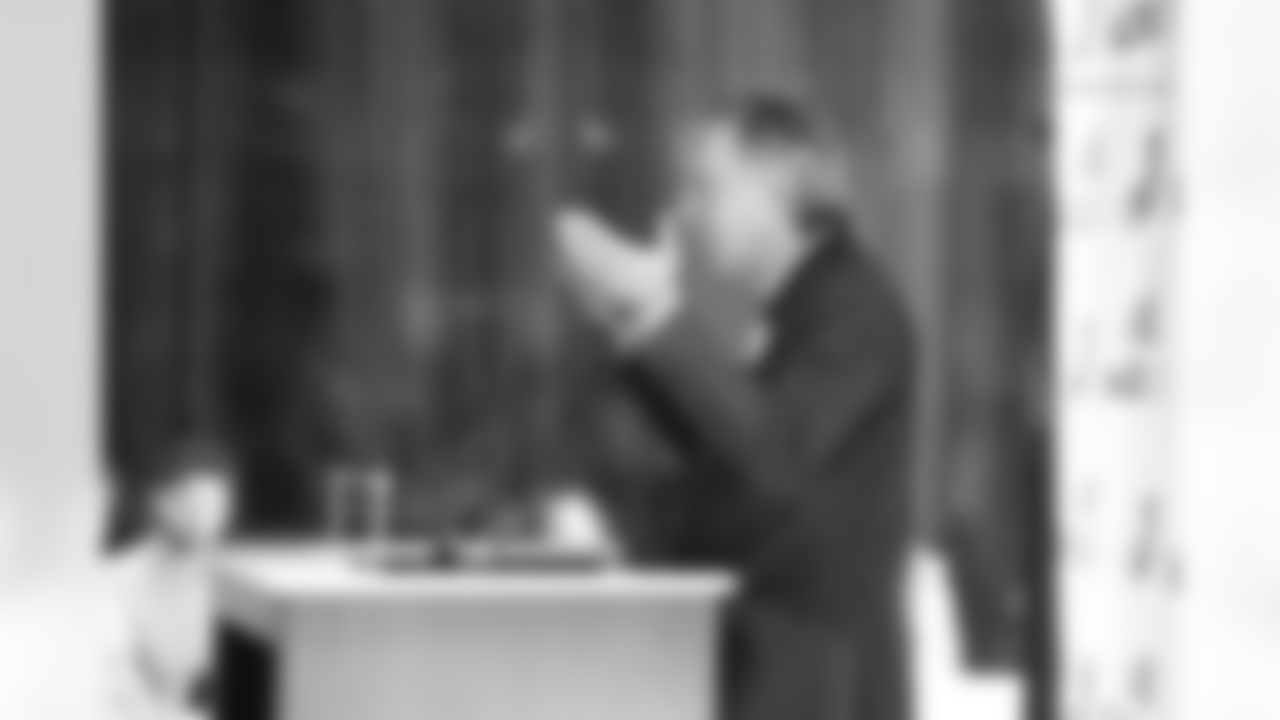While the Eagles are set to play in the first-ever NFL game in South America on Friday night, the organization has been making its mark in Brazil since it arrived earlier in the week.
On Thursday, the Eagles Autism Foundation hosted a roundtable in São Paulo to discuss the state of autism research and care in Brazil. The roundtable was hosted as part of the Eagles' connection to the Brazilian community that has been growing throughout the week.
The panel for the discussion was comprised of Eagles Chairman and CEO Jeffrey Lurie and five Brazilian-based medical researchers who have backgrounds in genetics, neuroscience, child psychiatry, and molecular biology, among other represented areas.
"The mission of the Eagles Autism Foundation is to improve the lives of those affected by autism in every community around the world," Lurie said. "The research being conducted in Brazil is highly impressive and has the potential to bring new ideas, technologies, and resources to the table. We are excited to expand our efforts in South America and look forward to funding even more progressive forms of research that can help individuals and families everywhere."
At the event, Eagles Autism Foundation Executive Director Ryan Hammond announced that the organization will be supporting Brazilian-based autism research with a $400,000 pilot grant which scientists in the area can apply for through September 30. The grant will support basic and clinical research, studies concentrating on affected individuals and families, and diverse model systems.
The roundtable saw attendance from more than 80 members of the autism research and scientific community in Brazil.
"If we can shine a light on autism as we travel as the Philadelphia Eagles to Brazil and authentically include into our plans while we're there, I think that's really what the vision for Jeffrey is all about," Hammond said.
Those in attendance learned more about Eagles Autism Foundation and its mission along with how important it is to help continue to aid autism research and care across the world.
"If you made a donation in 2024, you'll personally be supporting this initiative. You play a part in our team's history and something even more of a milestone for the foundation of supporting this effort and hopefully creating even more excitement and enthusiasm to do autism research in such a highly populated country," Hammond said.
Before the roundtable on Thursday, the NFL hosted a community day event in São Paulo. The event featured children of São Paulo as the league has continued its efforts of growing the sport of flag football globally.
During the community day, athletes from Special Olympics Pennsylvania and Special Olympics Brazil were invited by the Eagles Autism Foundation to join the clinic with their peers. With the help of a translator, Eagles Autism Foundation provided training to all coaches/volunteers at the event, a visual schedule, and sensory bags.
The participants went through a rotation of skills and drills that were designed to show them a taste of NFL Flag and develop the important skills of the game. The participants also got to meet the Eagles' mascot, SWOOP, and the Eagles Cheerleaders.
"You just see how the game has been expanding. It's a beautiful game and I think it's a game that's out there for everybody and I'm just excited to see it expand like it has and to be a part of that to help it expand. I'm excited to see where it goes," Jalen Hurts said about flag football in his press conference from Brazil on Thursday. Hurts was featured in the promotion of flag football being added as a sport in the 2028 Los Angeles Olympics during a commercial in August. – Written by Liam Wichser
As part of the team's connection to the Brazilian community this week, the Eagles Autism Foundation hosted a roundtable at the Rosewood Hotel in São Paulo on Thursday to discuss the current state of autism research and care in the country. The panel featured insights from Eagles Chairman and CEO Jeffrey Lurie and five Brazilian-based medical researchers who possess diverse backgrounds in genetics, neuroscience, child psychiatry, and molecular biology, among other represented areas.

Eagles Chairman and CEO Jeffrey Lurie and the Eagles Autism Foundation will support Brazilian-based autism research with a $400,000 pilot grant, which scientists in the area can apply for through September 30. The grant will support basic and clinical research, studies concentrating on affected individuals and families, and diverse model systems.

Attendees of the event gathered at the Rosewood Hotel for a photo.

From bottom left, Ryan Hammond, Executive Director of Eagles Autism Challenge, and Jeffrey Lurie, Philadelphia Eagles Chairman and CEO, pose with doctors and dignitaries at the NFL and Science in Brazil event.

Ryan Hammond, Executive Director, Eagles Autism Foundation

Sinter Belanger, PhD, Associated Professor, Federal University of São Paulo

Maria Rita Passos Bueno, PhD

Karina Griesi Oliveira, PhD, Researcher and Teacher, Research Institute Hospital Israelita Albert Einstein

Mariana Moyses-Oliveira, PhD

The roundtable discussion was attended by more than 80 members of the autism research and scientific community in Brazil.

Marimélia Porcionnatto, PhD, Full-time Professor, Federal University of São Paulo

Eagles Chairman and CEO Jeffrey Lurie with his wife, Tina

Fernando Menezes, Administrative Director FAPESP

Eagles Autism Foundation

A video presentation on the scientists being shown to the crowd.

Questions from the attendees.

Members of the audience listening on.













